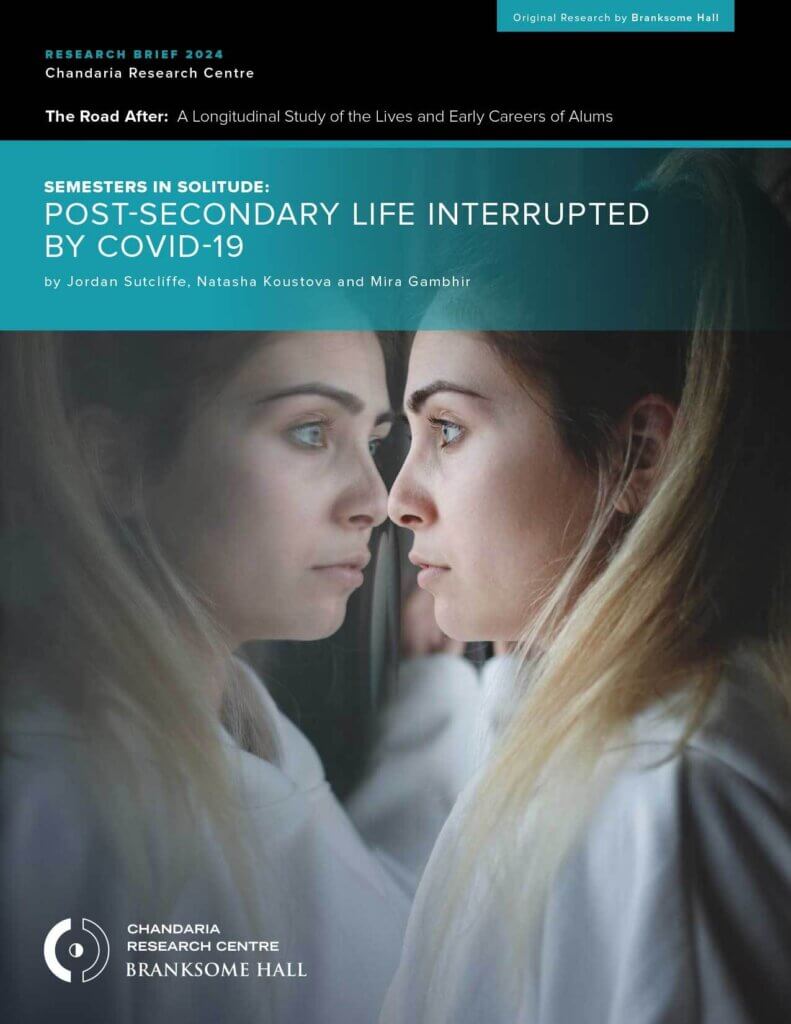Semesters in Solitude: Post-Secondary Life Interrupted by COVID-19
Published On:
Written By: Jordan Sutcliffe, Natasha Koustova and Mira Gambhir

The Road After: A Longitudinal Study of the Lives and Early Careers of Alums
Overview
This report focuses on the experiences of Branksome alums during the first two years of the COVID pandemic.
As students and educators know all too well, the COVID-19 pandemic abruptly and profoundly altered the educational landscape for several years. The consequences of these changes on students’ learning and well-being are just starting to become clear. This research brief explores both the negative and positive impacts of the pandemic on academic performance, social relationships and personal well-being of graduates from Branksome Hall, a girls’ independent school , who were enrolled in post-secondary education at the time the pandemic began. A number of recommendations aimed at post-secondary institutions, parents and students are provided to help support student resilience.
Introduction
Academically, students’ grades were lower during the onset of the pandemic, with students whose university programs structured classes for synchronous and collaborative online learning faring better than those who did not. Psychologically, stress has been compounding over time, with students who were closer to graduation from post-secondary being particularly uncertain about their futures. Many alums showed resilience in the face of dramatic societal change.
A large volume of research has been published in real time on the evolving relationships between COVID-19 disruptions and learning loss (Hammerstein et al., 2021), emergency online learning (Cameron & Presley, 2021; Cognia Innovation Lab, 2020) and youth mental health (Cost, et al., 2022; Thombs et al., 2020). Media outlets have declared youth mental health a pandemic of its own (e.g., Roxby, 2020; Wan, 2020), and some researchers pointed to school closures in particular as the cause of the decline in youth mental health (Cost et al., 2022). However, numerous and significant methodological challenges have been pointed out with regards to these studies, particularly since experts have been warning about a youth mental health crisis well before the pandemic (CBC Radio, 2019). A more recent meta-analysis of 137 studies, however, suggests that most youth were not at an additional increased risk of mental health problems during the initial years of the pandemic (Sun et al., 2023).
The most notable negative effects of the pandemic on mental health were a marginal increase in depressive symptoms in women or those that identify as female (Sun et al., 2023), suggesting further study is needed into the experiences of this demographic group. Now that some time has passed from the onset of the pandemic, it’s possible to begin reflecting on what unfolded during its early phases, while acknowledging that the situation is ongoing and fluid. Taking a nuanced approach to understanding pandemic-related challenges and experiences, this research brief explores the positive and negative experiences of female and gender minority post-secondary students in the areas of academics and personal and social well-being during the onset of the COVID-19 pandemic. These experiences were captured in The Road After, the Chandaria Research Centre’s longitudinal study tracking Branksome Hall graduates’ development into young adulthood.
